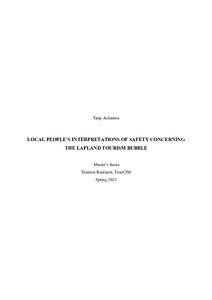Local people's interpretations of safety concerning the Lapland tourism bubble
Asilainen, Tarja (2023)
Asilainen, Tarja
Lapin yliopisto
2023
Julkaisun pysyvä osoite on
https://urn.fi/URN:NBN:fi-fe2023032333048
https://urn.fi/URN:NBN:fi-fe2023032333048
Tiivistelmä
The COVID-19 epidemic started in December 2019 and became a pandemic in 2020. Consequently, the tourism industry stopped due to restrictions. Different countries tried to save their tourism economies with the program of tourism bubble, which could allow travelling and secure the health of tourists and locals. Lapland was the critical area that would have benefitted from the tourism bubble. Finnish Lapland Tourist Board ry published a risk management model, The Lapland tourism bubble, with the Lapland Chamber of Commerce to make international tourism possible.
The theoretical approach comes from safety and security, which have been studied in tourism since the 1990s. Tourism requires a safe environment to survive, making studying safety and security essential. Traditional safety was seen as state-focused, but difficulties have shifted the focus to human-focused security issues. Individuals are the actors in human security, and health is one form of experiencing well-being. Perception of ordinary people of risks is more many-sided than the experts’ point of view, which makes local people’s point of view about the Lapland tourism bubble matter. Tourists are well-studied subjects from a security and safety point of view, but there is still a lack of research concerning the connection between tourism and locals’ perception of the safety, to which this research responds.
The general aim of this qualitative study was to understand how local people viewed the Lapland tourism bubble. Health security and experiences of tourism safety were researched as well. Data was collected with semi-structured interviews online in July 2021. Six locals from Rovaniemi were interviewed, who did not work in the tourism sector. This research used the tradition of social constructionism and the conventional content analysis approach.
The research results indicated that the Lapland tourism bubble was described as a tool that enables travelling and tourism recovery and brings economic benefits. It secures tourists and locals. On the other hand, security was more important than the economy, and COVID-19 required more safety measures than just the bubble. The locals could understand the health security in tourism comprehensively consequence of the pandemic. Experience of tourism safety was that despite the security measures, COVID-19 could spread.
The theoretical approach comes from safety and security, which have been studied in tourism since the 1990s. Tourism requires a safe environment to survive, making studying safety and security essential. Traditional safety was seen as state-focused, but difficulties have shifted the focus to human-focused security issues. Individuals are the actors in human security, and health is one form of experiencing well-being. Perception of ordinary people of risks is more many-sided than the experts’ point of view, which makes local people’s point of view about the Lapland tourism bubble matter. Tourists are well-studied subjects from a security and safety point of view, but there is still a lack of research concerning the connection between tourism and locals’ perception of the safety, to which this research responds.
The general aim of this qualitative study was to understand how local people viewed the Lapland tourism bubble. Health security and experiences of tourism safety were researched as well. Data was collected with semi-structured interviews online in July 2021. Six locals from Rovaniemi were interviewed, who did not work in the tourism sector. This research used the tradition of social constructionism and the conventional content analysis approach.
The research results indicated that the Lapland tourism bubble was described as a tool that enables travelling and tourism recovery and brings economic benefits. It secures tourists and locals. On the other hand, security was more important than the economy, and COVID-19 required more safety measures than just the bubble. The locals could understand the health security in tourism comprehensively consequence of the pandemic. Experience of tourism safety was that despite the security measures, COVID-19 could spread.
Kokoelmat
- Pro gradu -tutkielmat [4969]
